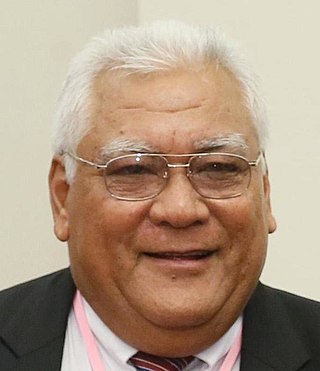
Tuvalu, formerly known as the Ellice Islands, is an island country in the Polynesian subregion of Oceania in the Pacific Ocean. Its islands are situated about midway between Hawaii and Australia. They lie east-northeast of the Santa Cruz Islands, northeast of Vanuatu, southeast of Nauru, south of Kiribati, west of Tokelau, northwest of Samoa and Wallis and Futuna, and north of Fiji. Tuvalu is composed of three reef islands and six atolls. They are spread out between the latitude of 5° and 10° south and between the longitude of 176° and 180°. They lie west of the International Date Line. Tuvalu has a population of 11,204. The total land area of the islands of Tuvalu is 26 square kilometres (10 sq mi).
Republicanism in Australia is a movement to change Australia's system of government from a constitutional parliamentary monarchy to a republic, typically a parliamentary republic that would replace the monarch of Australia with an Australian head of State. Republicanism was first espoused in Australia before Federation in 1901. After a period of decline after Federation, the movement again became prominent at the end of the 20th century after successive legal and socio-cultural changes loosened Australia's ties with the United Kingdom.

The current flag of Tuvalu was instated when the country became independent in 1978, after the separation from the Gilbert and Ellice Islands in 1976.
The politics of Tuvalu takes place in a framework of a parliamentary representative democratic monarchy, whereby the Monarch is the head of state, represented by the Governor-General, while the Prime Minister is the head of government. Executive power is exercised by the government.

A Commonwealth realm is a sovereign state that has Charles III as its monarch and head of state. Charles succeeded his mother, Elizabeth II, as monarch of the Commonwealth realms immediately upon her death on 8 September 2022. All the realms are equal with and independent of the others, though one person, resident in the United Kingdom, acts as monarch of each. The phrase Commonwealth realm is an informal description not used in any law.
The abolition of monarchy is a legislative or revolutionary movement to abolish monarchical elements in government, usually hereditary.

The Gilbert and Ellice Islands in the Pacific Ocean were part of the British Empire from 1892 to 1976. They were a protectorate from 1892 to 12 January 1916, and then a colony until 1 January 1976. The history of the colony was mainly characterized by phosphate mining on Ocean Island. In October 1975, these islands were divided by force of law into two separate colonies, and they became independent nations shortly thereafter: the Ellice Islands became Tuvalu in 1978, and the Gilbert Islands became part of Kiribati in 1979.

Maatia Toafa OBE is a Tuvaluan politician, representing Nanumea, who served two non-consecutive terms as Prime Minister of Tuvalu. He first served as Prime Minister from 2004 to 2006, from the resignation of his predecessor, Saufatu Sopoanga, until the defeat of his Cabinet in the 2006 general election. He was re-elected to parliament in the 2010 general election; and regained the premiership on 29 September 2010; however he lost the support of the parliament following a motion of confidence on 21 December of the same year. On 5 August 2013 Toafa became the Minister of Finance and Economic Development in the government of Prime Minister Enele Sopoaga. He was appointed as Deputy Prime Minister following the 2015 Tuvaluan general election. He was not re-elected in the 2019 general election.

The Australian republic referendum held on 6 November 1999 was a two-question referendum to amend the Constitution of Australia. The first question asked whether Australia should become a republic, with a President appointed by Parliament following a bi-partisan appointment model which had been approved by a half-elected, half-appointed Constitutional Convention held in Canberra in February 1998. The second question, generally deemed to be far less important politically, asked whether Australia should alter the Constitution to insert a preamble. Since the early 1990s opinion polls had suggested that a majority of the electorate favoured a republic. Nonetheless, the republic referendum was defeated.
Tuvalu elects a legislature on a national level. The Parliament of Tuvalu has 16 members, elected for a four-year term in 8 double-seat constituencies. Tuvalu is a de facto non-partisan democracy since it does not have political parties.

The Australian Monarchist League (AML) is an incorporated nonprofit organisation, that runs throughout Australia, promoting and educating on the Australian Constitution and monarchy. The organisation was part of the successful "no" campaign in the 1999 republic referendum, which asked whether Australia should become a republic and whether Australia should alter the constitution to insert a preamble. Neither of the amendments passed.
The Tuvaluan dollar is one of the currencies of Tuvalu, whose unofficial international currency code is TVD. Tuvalu has never had banknotes of its own, and has been issuing coins since 1976. However, the Tuvaluan dollar is used as a unit of account, and is pegged to the Australian dollar at parity. From 1966 to 1976, Tuvalu officially used the Australian dollar. In 1976, Tuvalu began issuing its own coins, which continue to circulate alongside Australian coins. Tuvalu continues to use Australian banknotes. Tuvaluan coins are not legal tender in Australia. Similar to the Faroese króna's relationship to the Danish krone and the Panamanian balboa's relationship to the United States dollar, the Tuvaluan dollar is not an independent currency, but a variation of the Australian dollar.

The Parliament of Tuvalu is the unicameral national legislature of Tuvalu. The place at which the parliament sits is called the Vaiaku maneapa. The maneapa on each island is an open meeting place where the chiefs and elders deliberate and make decisions.

Sir Kamuta Latasi is a political figure from the Pacific nation of Tuvalu from Funafuti atoll. He was elected to the Parliament of Tuvalu in 1992. Latasi served as the 4th Prime Minister of Tuvalu from 1993 until 1996. He has served as the Speaker of parliament from 2006 to September 2010 and again from December 2010 to March 2014.

Sir Iakoba Taeia Italeli is a Tuvaluan politician who was the governor-general of Tuvalu from 16 April 2010, until 22 August 2019, when he resigned to contest in the 2019 general election.

The monarchy of Tuvalu is a system of government in which a hereditary monarch is the sovereign and head of state of Tuvalu. The current Tuvaluan monarch and head of state since 8 September 2022, is King Charles III. As sovereign, he is the personal embodiment of the Tuvaluan Crown. Although the person of the sovereign is equally shared with 14 other independent countries within the Commonwealth of Nations, each country's monarchy is separate and legally distinct. As a result, the current monarch is officially titled King of Tuvalu and, in this capacity, he and other members of the royal family undertake public and private functions domestically and abroad as representatives of the Tuvaluan state. However, the King is the only member of the Royal Family with any constitutional role.
There are six monarchies in Oceania where supreme power resides with an individual hereditary head, who is recognised as the head of state. Each is a constitutional monarchy, wherein the sovereign inherits his or her office, usually keeps it until death or abdication, and is bound by laws and customs in the exercise of their powers. Five of these independent states share King Charles III as their respective head of state, making them part of a global grouping known as the Commonwealth realms; in addition, all monarchies of Oceania are members of the Commonwealth of Nations. The only sovereign monarchy in Oceania that does not share a monarch with another state is Tonga. Australia and New Zealand have dependencies within the region and outside it, although five non-sovereign constituent monarchs are recognized by New Zealand, Papua New Guinea and France.

The governor-general of Tuvalu is the vice-regal representative of the Tuvaluan monarch, currently King Charles III, in the country of Tuvalu.
The Constitution of Tuvalu states that it is “the supreme law of Tuvalu” and that “all other laws shall be interpreted and applied subject to this Constitution”; it sets out the Principles of the Bill of Rights and the Protection of the Fundamental Rights and Freedoms.











